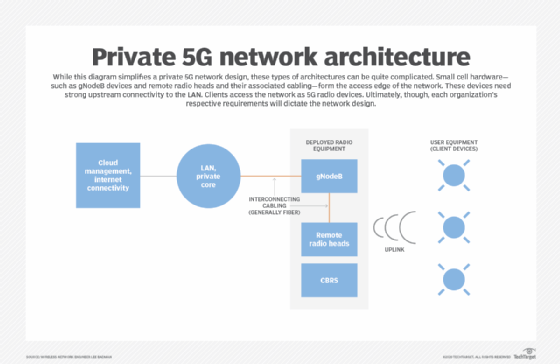
Getty Images/iStockphoto
Explore private wireless network vendor options
Private wireless networks can be difficult to deploy. Networking vendors -- such as Celona, Cradlepoint and Extenet -- offer services that could simplify the process.
The release of Citizens Broadband Radio Service, or CBRS, spectrum has opened up wireless spectrum for enterprises. While the spectrum was initially available only for the U.S. Navy, the Federal Communications Commission opened new tiers for public use. This has created a host of new use cases, such as the ability for enterprises to deploy private wireless networks.
Private wireless networks are large investments, however, and aren't for every organization. It's typically challenging and time-consuming for enterprises to deploy a private wireless network. They must purchase spectrum and network components, as well as hire a team of professionals to manage the infrastructure. For some organizations, the ends don't justify the means. For others, the desire to own and manage their own infrastructure outweighs the challenges.
Enterprises own and operate their private wireless networks, but that doesn't mean they have to do it alone. Private wireless networking vendors -- such as Celona, Cradlepoint and Extenet -- offer technology that helps organizations with their networking deployments. Enterprises should evaluate which private wireless networking vendor options suit their needs and meet business goals.
Celona
Celona, a pioneer in the private cellular networking space, was one of the first providers to offer technology for organizations to create private 5G networks. Celona's 5G LAN architecture includes the necessary components to design a private wireless network, including the following:
- Radio devices.
- Network controllers.
- Wireless access points.
- SIM cards.
- Cloud-based GUI.

Any organization can take advantage of a private network deployment. But, according to David Callisch, marketing director at Celona, medium- and large-sized organizations that want to streamline and automate processes typically deploy private wireless networks in indoor and outdoor environments.
Wi-Fi can cause a network to experience latency or disconnect altogether, which then hinders network performance. Cellular technology is an alternative for enterprises in need of a more stable connection, Callisch said.
Celona offers its technology as a subscription-based service. Organizations can purchase from Celona directly or from systems integrators (SIs) and VARs. When organizations purchase Celona's products from their preferred partner, they can integrate the private wireless technology into their current wireless LANs.
Callisch said, if enterprises prefer, they can have SIs deploy the technology for them. However, the technology is simple enough for an organization's in-house networking team to deploy themselves, which enables them to save on costs and have more control over the network. For some organizations, cellular connectivity is the ideal option for reliable connectivity that powers business-critical applications and tools.
"As the market moves to Industry 4.0-type use cases, the success of the applications is predicated on the use of private wireless," Callisch said. "Best-effort wireless connectivity is not suitable for the kind of quality of service and the service assurance these applications require."
Cradlepoint
Cradlepoint, part of Ericsson, offers hardware and software services that support enterprises of all sizes and industries. Matt Addicks, senior solutions marketing manager at Cradlepoint, said organizations of all sizes and verticals can benefit from a private wireless network, from large Fortune 500 companies to SMBs. He added that the decision to deploy a private wireless network comes down to the organization's critical devices because Wi-Fi isn't reliable enough to support those needs.
"Wi-Fi is great in certain instances, but for business-critical, industry-critical and mission-critical applications, there are some challenges [with Wi-Fi] in terms of coverage, reliability and security," Addicks said.
Enterprises can use Cradlepoint's NetCloud Manager to manage their private wireless networks. Rather than organizations purchasing separate private wireless network components from multiple vendors, NetCloud Manager converges the components into a single platform and helps manage them.
Addicks said the platform is best suited for nonindustrial organizations -- such as universities, healthcare facilities and campus environments -- while Ericsson's Private 5G platform is better for large, industrial organizations.
Cradlepoint provides these platforms, and SIs -- either partners associated with Cradlepoint or third-party partners -- use the tools to deploy private wireless networks for customers. These partners consult with organizations to find the integrations they need and figure out how to design and construct the networks, Addicks said.
Extenet
Extenet offers technology that enables enterprises to design their own private wireless networks. But Extenet also deploys and operates private wireless networks for enterprises that want an outside entity to manage their networks.
The defining characteristic of a private wireless network is that the organization builds the network and owns and manages the infrastructure. However, the network is still considered private even if an organization outsources management to a third-party company. Jay Floyd, vice president of corporate strategy at Extenet, likened this scenario to a bank.
When an individual deposits money into a bank, they own the funds, but bank managers assist them with how to manage their finances. Extenet manages private wireless networks in the same way, Floyd said. A third-party organization might build and own the private network, but it tailors the network to meet the enterprise's needs.
"[Organizations] don't own the network, but they certainly own the use cases and the data routed across the network," Floyd said.
It's crucial for organizations to understand their use cases as pivotal drivers when deploying a private wireless network. Every organization has different objectives, and Extenet helps identify those goals to design and deploy the networks on behalf of their customers, Floyd said.
"We manage that complexity and allow [organizations] to focus on their core business, which is around their customers or consumers," Floyd said. "We want to make sure we provide that network piece for them."
How private wireless networking vendors can help
Private wireless networks give organizations greater control over their network infrastructures. They can permit who enters the network and what applications they can access; enable new use cases, like IoT operations; and save on costs. But, because enterprises must purchase the components and build the networks themselves, private wireless networks can be costly and take time to deploy. The switch from Wi-Fi to private wireless could mean trading one problematic mode of connectivity for another.
Services from private wireless networking vendors can help ease some of this burden. Organizations can choose to buy private wireless networking components directly from vendors or use a partner to manage the infrastructure on their behalf.
No two vendors offer the same platform, as architectures, costs and services differ between providers. But one factor that remains the same is the benefits gained from a deployment. Enterprises can support business objectives, save on costs and have the control they desire.






